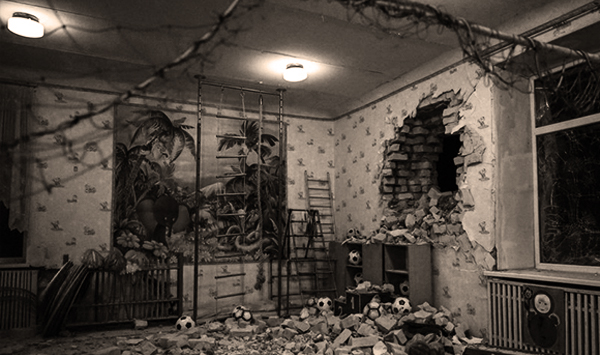Français | English
For the other articles see > SPECIAL ARCHIVE UKRAINE
In the preceding thread of this column, I placed Rojava and the Ukrainian people side by side around the notion of resistance. And I addressed myself with a “yes, but that’s not the same”, asking for an explanation of the difference, if there was one.
Explanations concerning Ukraine reached me from the “left”, these last few days. After summarizing them, I’ll express my own views.
We should not provide aid to Ukrainians’ “resistance” so as not to “add war to war”, the argument goes with a proud draping of one’s self in Jaurès’ shroud. With no need to go searching in any depth, I find this very expression in the mouth of a certain François Mitterand, who served as mentor to the one spewing it today. Mitterand was talking about Sarajevo then, and adamantly opposed a lifting of the embargo on weapons directed to the Bosniac resistance. He even went so far as to pronounce these words on the tarmac of that town’s airport, when he announced he was not against the sending of ambulances.
Four years later into the siege, Bosnia was tallying its dead, and found itself dismantled under the guise of a shared administration; this same Mitterand had then accepted the evidence of a reunification in Germany.
Since then, the trace disappeared of those who, during this war, had consolidated a civilian organization of populations in Sarajevo, Bihać, Goražde, an organization devoid of ethnic divisions. This absence of massive support led to the triumph of nationalisms and Statism in the exit from war, against the embryonic organizations born for the survial of the popular option of living together. An achievement even better than Stalin’s standby when faced with the destruction of the resistance against nazism of Warsaw’s people.
If I return yet again to this recent history, it is not only because I experienced it, but because it revealed to me that a war of resistance could give rise to unexpected popular resilience, and even, to an emancipation, as long as there existed in the population a political will to support it.
In 2011, who would have thought that the part of Kurdistan in Syria, while in the midst of war, would give birth to the emancipation project of Rojava? The various leftists at the time mainly cried out about the American instrumentalization of the Arab Springs, always in the same campist position I mentioned in my preceding column. And how did these some ones come to display support for the “Kurdish People” following about-turns so hurriedly forgotten?
Why was it that active support for Rojava, the popularization of the communalist political project came from the “anarchist spectrum” with its well-known limited political forces, rather than from the leftists who make loud protests during marches, only to adopt a clientelist approach to the Kurdish cause?
I am not saying that leftist militants are not sincere in their support nor that many of them, when faced with reality, did not understand the importance of the “democratic confederalism” project. I’m talking of the fact that this very project is incompatible with the Statism claimed by these same left wing movements, which leads them to vary and waver in positions where chauvinism often dominates when campism does not take the lead, all of it resulting in support for regimes laboring against their own peoples, and all in the name of “anti imperialism”.
This is why I am told that the Kurdish struggle (while omitting their allies, in passing) would be imbued with a kind of transparency and purity on the question of the “peoples’ right to self-determination”, a purity not shared by the Ukrainian populations. The latter would be ugly Atlantists, aspiring to the EU and its liberal world and infiltrated by neo-nazism. Here again, I find a variation on the discourse of social democrats and former Stalinists, fashionable at the time of the explosion of ex-Yugoslavia, who were then talking in terms of ethnic and religious wars.
Others use Jaurès’ shroud as a poster board for non-aligned pacifism.
Once again I repeat that the deceased Jaurès did not use his opposition to war as a selfish and chauvinistic pacifist, but rather that he denounced the unavoidable conflict between world-ruling Empires who had found nothing further to split among themselves than the world itself. All parties to the conflict had its own war ambition at the time. For that Left, there was no main enemy, no the friend of my friend. And Jaurès’ position was not a moral one. Thus, there is nothing but grandstanding involved in appealing to a deceased in order to justify one’s own basic reactions. The man deserves to rest in peace.
If some were attempting to increase the confusion around “non-alignment”, they wouldn’t manage a better job of it. Such a principle is most correct, but this principle is also used by those who would like to arm peoples in secondary imperialisms. This principle accompanied the fact France acquired the nuclear weapon. A European defence? A doubling of military budgets? This deserves another article.
And who is talking of pushing European States to war? Who is asking for the military intervention of powers, some of which have nuclear capabilities? Did not NATO announce from the onset that it would remain an observer, after having provided its own fuel to the fire?
This military system cannot be exonerated from its intentions. But there again, the issues shouldn’t be simplified in a binary fashion.
It is precisely because Putin knew that NATO could not budge that he put into motion his war of annexation. And this political project, begun in Georgia, Moldavia, reaching its completion in Belarus, not to forget the martyrdom of Chechnya, this policy of external interventions is not legitimately defensible as that of facing up to a “threat”; it is clearly inspired by an ambition to forcibly re-introduce itself into the club of imperialist powers.
Unless we consider human history as a matter of succeeding imperialist plots to which peoples are subjected without achieving true existence, we must stop transforming the way the world turns into a caricature, and stand on the side of attacked peoples, breaking with reflexes of chauvinistic withdrawal. That might lead to a leftist voice that matters, when dealing with what capitalist States are finaggling between themselves.
This requires avoiding the crushing of people’s will, and as a minimum providing them with the means to resist, means that may range from plain expressions of solidarity to the designation and condemnations of the aggressor without a “yes, but” tacked on to it, all the way to concrete aids including weapons.
How can this Left have an audible voice on the matter of refugees, for example? How can this Left which feeds into “the fear of war” and of its consequences, how could it resonate in denouncing the selection of migrants, tolerated and organized on the doors of Ukraine?
While the French population is subjected to racism, and the instrumentalization of the fear of migrants essentialized as Muslims, while purely moralistic discourses dominate in the debates against the theories of the “great replacement”, confusion nourished by a trans-Party republican spring, and by the left also, even if involuntarily, by its very positioning, seems to lay the blame on “Europeist” Ukrainians for the racist sorting happening at the borders. But isn’t the EU the one organizing it as it has been doing for decades? And what about Putin and his Belarusian ally’s practices in the matter?
Who, of the EU, of Putin and of his Bielorusian and Turkish momentary allies has also led to the death of men, women and children on the borders?
One can see where an untethered discourse about “peace” vs the instrumentalization of legitimate fears over “war” can lead: to being inaudible on the issue of the imperative of unconditional welcoming of migrants at the EU’s borders and, as powerless observers, to sowing the last seeds of confusion no one needs in this capitalism under crisis, when there is need for the most elementary of solidarities.
Since “Godot” hasn’t fallen yet, nor Ukraine, I will carry on with this column, while still waiting for what the title mentions.
To be continued…
For the other articles see > SPECIAL ARCHIVE UKRAINE
Translation from French by Renée Lucie Bourges
Support Kedistan, MAKE A CONTRIBUTION.




